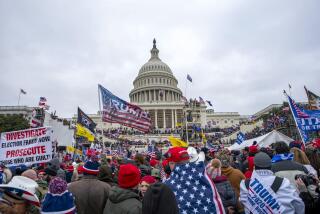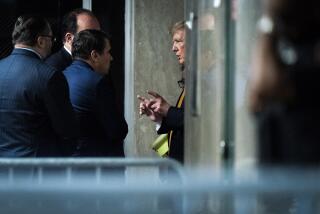Disbarment Too Harsh, Clinton Lawyers Argue
- Share via
WASHINGTON — President Clinton challenged a move to strip him of his license to practice law in Arkansas, declaring in legal papers filed Tuesday that such a penalty would be “excessively harsh” and without precedent.
The president’s statement, submitted to an Arkansas state court by Washington attorney David E. Kendall, came in response to a lawsuit filed last month by an ethics panel of the Arkansas Supreme Court. The panel condemned Clinton for “serious misconduct” in allegedly using “dishonesty, deceit, fraud and misrepresentation” to hide his affair with former White House intern Monica S. Lewinsky.
The lawsuit stemmed from a lengthy investigation by the ethics committee that was given impetus last year when a federal judge in Little Rock, Ark., found Clinton in contempt of court for his testimony in the Paula Corbin Jones sexual harassment case.
U.S. District Judge Susan Webber Wright, who fined Clinton more than $90,000 for contempt, said that the president had obstructed justice by giving “false and misleading” answers when asked in a sworn deposition about his relationship with Lewinsky. Wright found that Clinton had been untruthful when he denied ever being alone with Lewinsky or having sexual relations with her.
The ethics panel’s inquiry was launched in late 1998 after the conservative Southeastern Legal Foundation of Atlanta filed a complaint on the same grounds. The issue ultimately will be decided by Pulaski County Circuit Judge Leon Johnson after he considers all the evidence. No date for a hearing has been set, but some officials have recommended a resolution before the end of this year, when Johnson will leave office.
Whether Clinton wins or loses the battle, the case puts renewed attention on a scandal that Vice President Al Gore’s presidential campaign has sought to shelve and that Clinton had hoped to put behind him months ago.
Instead, Clinton faces potential punishment in two separate jurisdictions for his statements about the Lewinsky matter. Whitewater independent counsel Robert W. Ray confirmed earlier this month that he has impaneled a new federal grand jury in Washington to consider whether to indict Clinton for allegedly lying and obstructing justice in his testimony about Lewinsky. Ray has said that any criminal action against Clinton would come only after he leaves office in January.
While Clinton consistently has denied lying under oath or obstructing justice, in August 1998 he acknowledged having an “improper relationship” with Lewinsky and conceded that some of his answers in his Jones case deposition had been misleading.
The House impeached Clinton for his testimony, but the Senate voted against removing him from office.
In their court papers filed Tuesday, Clinton’s lawyers said that, based on the facts of Clinton’s case and the history of previous disbarments in Arkansas, “a sanction of disbarment [for Clinton] would be excessively harsh, impermissibly punitive and unprecedented in the circumstances of this case.”
His attorneys, however, agreed with the ethics committee’s claim that Clinton was trying to save face when asked about Lewinsky in his Jones case deposition in January 1998.
Clinton “took actions motivated in part by a desire to protect himself and others from embarrassment,” the lawyers wrote, adding that testimony in such circumstances is not a grave matter.
Clinton said at a news conference two years ago that he always considered the Jones lawsuit to be an illegitimate, politically motivated action. Wright, in fact, ruled that the Lewinsky matter was irrelevant to the lawsuit and later dismissed Jones’ case.
But Clinton, fearful that an appellate court might reinstitute the lawsuit, subsequently settled it out of court for $850,000.
Clinton never challenged Wright’s contempt finding or her $90,000 penalty, but his attorneys said that was because the president felt he should concentrate on the needs of the country first.
Matt Glavin, president of Southeastern Legal Foundation, said Tuesday that disbarment is a fitting sanction for the president.
Glavin said that “disbarment is generally appropriate when a lawyer, with the intent to deceive the court, makes a false statement, submits a false document or improperly withholds material information.”
Richard Nixon, after resigning the presidency during the Watergate scandal, also resigned from the bars of California and the U.S. Supreme Court. He offered his resignation from the New York state bar as well. But a panel of state appellate judges voted, 4 to 1, to reject his resignation in favor of ordering him formally disbarred.
More to Read
Sign up for Essential California
The most important California stories and recommendations in your inbox every morning.
You may occasionally receive promotional content from the Los Angeles Times.













